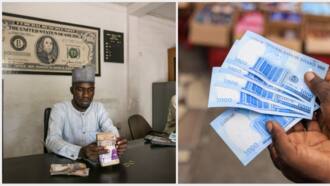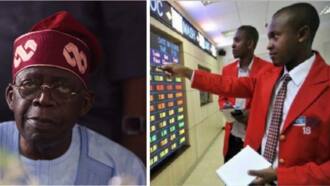Forex Scarcity: Dollar Inflows to Nigeria Drop, May Worsen in Second Quarter of 2023
- Dollar inflows from different sources to Nigeria, in recent times, have continued to drop
- Last year, inflows declined in almost every capacity, thus highlighting the pressing issue of forex scarcity in the country
- Businesses and individuals are being affected by the shortage of forex across official and unofficial markets
PAY ATTENTION: Сheck out news that is picked exactly for YOU ➡️ click on “Recommended for you” and enjoy!
The Nigerian economy is facing a severe shortage of foreign exchange as dollar inflows have dropped notably in recent months.
This is according to the Central Bank of Nigeria (CBN)'s quarterly bulletin for the fourth quarter of 2022.
The shortage, the report says, is due to several factors, including the global economic slowdown, the war in Ukraine, and the COVID-19 pandemic.

Source: UGC
The CBN has been trying to address the problem by selling dollars to commercial banks and other authorised dealers.

Read also
Ecobank grows profit by 18% to $308 million in 6 months, CEO explains financial performance
PAY ATTENTION: Share your outstanding story with our editors! Please reach us through info@corp.legit.ng!
However, the supply of dollars is still not meeting the demand, leading to a sharp rise in the dollar price.
Key indicators of forex inflow decline
CBN's data showed that forex inflows for 2022 stood at $72.3 billion, a decline of 23% from $94.3 billion recorded in 2021 and a 37.4% decline from $115.6 billion obtained in 2020.
Also, in 2022, an outflow was recorded at $40.99 billion, a slight decline from the $41.62 billion recorded for 2021, indicating a net surplus of $31.39 billion.
Further analysis showed that Foreign Direct Investment (FDI) in Nigeria in 2022 declined by 33% to $468.1 million from $698.87 million recorded in 2021. Foreign portfolio investment fell by 27.9% to $2.44 billion in the review year.
The drop in dollar inflows into the economy has also greatly affected the CBN's dollar supply in the foreign exchange market. Data reveals that the CBN supplied $15.27 billion into the economy in 2022 through SMEs, I&E window, and Invisibles.

Read also
Naira bounces back appreciates in value by N51.34 against US dollar after CBN's intervention
This marks a decline of 15.3% from $18.03 billion recorded in 2021 and a 31.1% drop from $22.16 billion in 2020 supply.
Ifeanyi Ubah, Researcher Analysts at Comercio Partners, told Legit.ng that the drop in forex supplied by the apex bank in 2022 might be partially attributable to the banning of forex sales to Bureau De Change (BDC) operators.
He said:
When the CBN sold forex to BDC operators in the past, there was a lot more supply. But after the halt of the sales of forex to them, the supply automatically dropped. But unfortunately, this policy of banning sales to BDC operators seems to have worsened the scarcity.
Impact of forex shortage on Nigeria's economy
The shortage of foreign exchange is a serious problem that is having a negative impact on the Nigerian economy.
Here are some of the specific impacts of the forex scarcity:
- Businesses struggle to import raw materials and equipment, leading to higher prices and declining production.
- Nigerians find it more challenging to travel abroad and send money to relatives overseas.
- The cost of living is rising as businesses pass on the higher costs of imports to consumers.
- The economy is growing more slowly as businesses cannot invest and expand.
The scarcity of dollars has hit companies and individuals hard in the last year. Tobi Amosu, a Lagos-based businessman, told Legit.ng that he could not get enough dollars to pay his daughter's school fees from official sources.
He said:
I was told at the bank that there was not enough forex for everyone and so, the banks needed to ration the distribution to customers. At the end of the day, I have to patronise the black marketers to get the much I needed to make up for my daughter's school fees abroad.
The CBN has said it is working to address the problem of forex scarcity. However, it is unclear how long it will take for the situation to improve.
In the meantime, Nigerians will likely continue to face difficulties due to the shortage of foreign exchange.
World Bank says Nigerians in diaspora remitted $168 billion in 8 years
In a related story, Legit.ng reported that the World Bank stated that diaspora Nigerians sent about $168.33 billion to the country in the past eight years.
This is as foreign investment inflow into the country dipped in the period under review, mainly driven by a scarcity of forex, leading to the collapse of the naira.
The World Bank and Nigeria’s Budget Office data revealed that Nigerians abroad played a prominent role in satisfying the impact of foreign exchange scarcity and keeping the country’s forex reserve afloat.
The World Bank estimates that a total of $20.9 billion was remitted by Nigerians in Diaspora in 2022.
Source: Legit.ng


